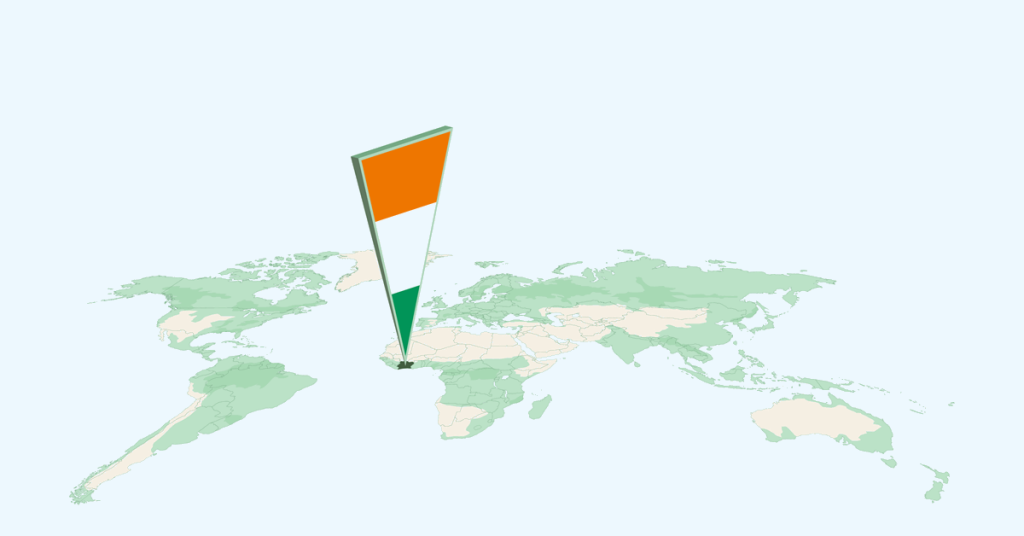Eni SpA said it has signed an exploration contract with the Ivorian Ministry of Mines, Petroleum and Energy for the CI-707 offshore block in Abidjan, Côte d’Ivoire.
The license covers an area of around 1,130 square miles (2,926 square kilometers) in the Ivorian sedimentary basin, at a water depth of between 3,280 and 9,843 feet (1,000 and 3,000 meters). The planned exploration period has a maximum duration of 9 years, Eni said in a news release.
The area covered by the license is geologically continuous with the nearby CI-205 block, where Eni announced the discovery of Calao in March 2024, according to the release.
“This proximity offers a strategic opportunity for the identification of potential similar structures, paving the way for future synergistic developments,” the company said.
Eni said it has been operating in Côte d’Ivoire since 2017 with current equity production of over 62,000 barrels of oil and more than 75 million cubic feet of gas per day, set to rise to 150,000 barrels of oil and 200 million cubic feet of gas with the start of its phase 3 project.
The company is active in 10 offshore blocks in the country: CI-101, CI-205, CI-401, CI-501, CI-504, CI-526, CI-706, CI-708, CI-801 and CI-802.
Solar Project Commissioned in Kazakhstan
Meanwhile, Eni’s Plenitude said it has commissioned a 50-megawatt (MW) solar power plant in Zhanaozen, located in Kazakhstan’s Mangystau Region, as part of a project led by Eni and KazMunayGas (KMG).
The plant is part of a 247-MW hybrid power plant that integrates solar, wind and gas power generation. The plant will contribute to the electricity needs of KMG facilities in the surrounding area, Eni said in a separate statement.
Equipped with state-of-the-art photovoltaic technology, including more than 80.000 panels on an area of around 80 hectares, the facility is expected to produce 86 gigawatt-hours of renewable energy annually. The hybrid configuration combines renewable energy sources with gas generation to guarantee a stable supply, even under variable weather conditions, according to the statement.
“The commissioning of the solar plant represents a milestone for the Mangystau Hybrid Power Project, contributing to Kazakhstan’s broader energy transition. It reflects the effectiveness of combining international expertise with local commitment and lays a strong foundation for future collaboration in the country’s renewable energy sector,” Federico Pugliese, managing director of Plenitude Kazakhstan, said.
Under the long-standing partnership between KazMunayGas and Eni, the project will contribute to the Mangystau region’s energy transition pathway, support its economic growth through job creation, technological development, and local capacity building, the statement said.
Plenitude, a company controlled by Eni, said it is present in more than 15 countries around the world with a business model that integrates the production of electricity from renewable sources. The company has 4.5 gigawatts (GW) of installed capacity, and an extensive network of 22,000 charging points for electric vehicles, providing energy and energy solutions to over 10 million European customers, according to the statement.
Plenitude said it aims to reach 10 GW of installed renewable capacity worldwide by 2028.
To contact the author, email rocky.teodoro@rigzone.com
Generated by readers, the comments included herein do not reflect the views and opinions of Rigzone. All comments are subject to editorial review. Off-topic, inappropriate or insulting comments will be removed.
element
var scriptTag = document.createElement(‘script’);
scriptTag.src = url;
scriptTag.async = true;
scriptTag.onload = implementationCode;
scriptTag.onreadystatechange = implementationCode;
location.appendChild(scriptTag);
};
var div = document.getElementById(‘rigzonelogo’);
div.innerHTML += ” +
‘‘ +
”;
var initJobSearch = function () {
//console.log(“call back”);
}
var addMetaPixel = function () {
if (-1 > -1 || -1 > -1) {
/*Meta Pixel Code*/
!function(f,b,e,v,n,t,s)
{if(f.fbq)return;n=f.fbq=function(){n.callMethod?
n.callMethod.apply(n,arguments):n.queue.push(arguments)};
if(!f._fbq)f._fbq=n;n.push=n;n.loaded=!0;n.version=’2.0′;
n.queue=[];t=b.createElement(e);t.async=!0;
t.src=v;s=b.getElementsByTagName(e)[0];
s.parentNode.insertBefore(t,s)}(window, document,’script’,
‘https://connect.facebook.net/en_US/fbevents.js’);
fbq(‘init’, ‘1517407191885185’);
fbq(‘track’, ‘PageView’);
/*End Meta Pixel Code*/
} else if (0 > -1 && 88 > -1)
{
/*Meta Pixel Code*/
!function(f,b,e,v,n,t,s)
{if(f.fbq)return;n=f.fbq=function(){n.callMethod?
n.callMethod.apply(n,arguments):n.queue.push(arguments)};
if(!f._fbq)f._fbq=n;n.push=n;n.loaded=!0;n.version=’2.0′;
n.queue=[];t=b.createElement(e);t.async=!0;
t.src=v;s=b.getElementsByTagName(e)[0];
s.parentNode.insertBefore(t,s)}(window, document,’script’,
‘https://connect.facebook.net/en_US/fbevents.js’);
fbq(‘init’, ‘1517407191885185’);
fbq(‘track’, ‘PageView’);
/*End Meta Pixel Code*/
}
}
// function gtmFunctionForLayout()
// {
//loadJS(“https://www.googletagmanager.com/gtag/js?id=G-K6ZDLWV6VX”, initJobSearch, document.body);
//}
// window.onload = (e => {
// setTimeout(
// function () {
// document.addEventListener(“DOMContentLoaded”, function () {
// // Select all anchor elements with class ‘ui-tabs-anchor’
// const anchors = document.querySelectorAll(‘a .ui-tabs-anchor’);
// // Loop through each anchor and remove the role attribute if it is set to “presentation”
// anchors.forEach(anchor => {
// if (anchor.getAttribute(‘role’) === ‘presentation’) {
// anchor.removeAttribute(‘role’);
// }
// });
// });
// }
// , 200);
//});

